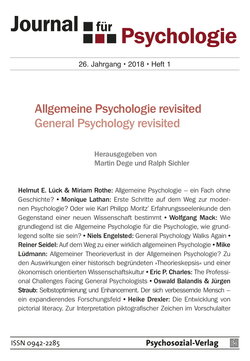Mike Lüdmann
(PDF)
Sofortdownload
Dies ist ein E-Book. Unsere E-Books sind mit einem personalisierten Wasserzeichen versehen,
jedoch frei von weiteren technischen Schutzmaßnahmen (»DRM«).
Erfahren Sie hier mehr zu den Datei-Formaten.
Ein auffälliges Charakteristikum der gegenwärtigen »Fachkultur« der Allgemeinen Psychologie ist, dass profunde theoretische Arbeit zugunsten einer relativ unkoordinierten Akkumulation empirischer (häufig inhaltlich wenig aussagekräftiger) Detailbefunde stark vernachlässigt wird. Während es zu vielen Neuerungen und Verfeinerungen auf dem Gebiet der Forschungsmethoden gekommen ist, ist der inhaltliche Theoriefortschritt sehr ins Stocken geraten und die Schaffung eines kohärenten konzeptuellen Gerüsts im Sinne eines Rahmenmodells der Psychologie in noch größere Ferne gerückt. Hierzu soll die Frage thematisiert werden, welche fachbezogenen historischen Verläufe sowie welche gesellschaftlichen, (wissenschafts-)politischen Bedingungen der gegenwärtigen Wissenschaftskultur diese Situation herbeigeführt haben. Zum einen spielen historische Gründe eine Rolle, die als eine »gescheiterte Vergangenheitsbewältigung« in Bezug auf die vergleichsweise späte Loslösung der Psychologie von der Philosophie bezeichnet werden können. Zum anderen lassen sich wissenschaftssoziologische Fehlsteuerungsprozesse ausfindig machen, die im Zusammenhang der Ökonomisierung des Wissenschaftsbetriebs stehen.
Abstract:
A conspicuous characteristic of the currently »professional culture« of psychology is that profound theoretical work is be neglected in favor of a relatively unfocused accumulation of empirical (often not very meaningful) detailed findings. While there have been many innovations and refinements in the field of research methods, the progress of the theoretical contents has been come to a standstill. Therefore, the creation of a coherent conceptual framework model of psychology receded into the distance. Concerning this, the question should be discussed which specialized historical developments as well as which social and political conditions of the currently scientific culture have led to this situation. On the one hand, historical reasons may play a role which can be described as a »failed coping with the past« relating to the late detachment of psychology from philosophy. On the other hand there can be found mismanaged socio-scientific processes which are connected with the economization of scientific activities.
Abstract:
A conspicuous characteristic of the currently »professional culture« of psychology is that profound theoretical work is be neglected in favor of a relatively unfocused accumulation of empirical (often not very meaningful) detailed findings. While there have been many innovations and refinements in the field of research methods, the progress of the theoretical contents has been come to a standstill. Therefore, the creation of a coherent conceptual framework model of psychology receded into the distance. Concerning this, the question should be discussed which specialized historical developments as well as which social and political conditions of the currently scientific culture have led to this situation. On the one hand, historical reasons may play a role which can be described as a »failed coping with the past« relating to the late detachment of psychology from philosophy. On the other hand there can be found mismanaged socio-scientific processes which are connected with the economization of scientific activities.
Martin Dege & Ralph Sichler S. 3–8Editorial (PDF)
Helmut E. Lück & Miriam Rothe S. 9–29 (PDF)
Monique LathanS. 30–48 (PDF)
Wolfgang MackS. 49–73 (PDF)
Niels EngelstedS. 74–96General Psychology Walks Again (PDF)
Reiner SeidelS. 97–122 (PDF)
Mike LüdmannS. 112–122 (PDF)
Eric P. CharlesS. 123–130The Professional Challenges Facing General Psychologists (PDF)
Oswald Balandis & Jürgen Straub S. 131–155Selbstoptimierung und Enhancement (PDF)
Der sich verbesserndeMensch - ein expandierendes ForschungsfeldHeike DrexlerS. 156–177 (PDF)
Helmut E. Lück & Miriam Rothe S. 9–29 (PDF)
Monique LathanS. 30–48 (PDF)
Wolfgang MackS. 49–73 (PDF)
Niels EngelstedS. 74–96General Psychology Walks Again (PDF)
Reiner SeidelS. 97–122 (PDF)
Mike LüdmannS. 112–122 (PDF)
Eric P. CharlesS. 123–130The Professional Challenges Facing General Psychologists (PDF)
Oswald Balandis & Jürgen Straub S. 131–155Selbstoptimierung und Enhancement (PDF)
Der sich verbesserndeMensch - ein expandierendes ForschungsfeldHeike DrexlerS. 156–177 (PDF)

